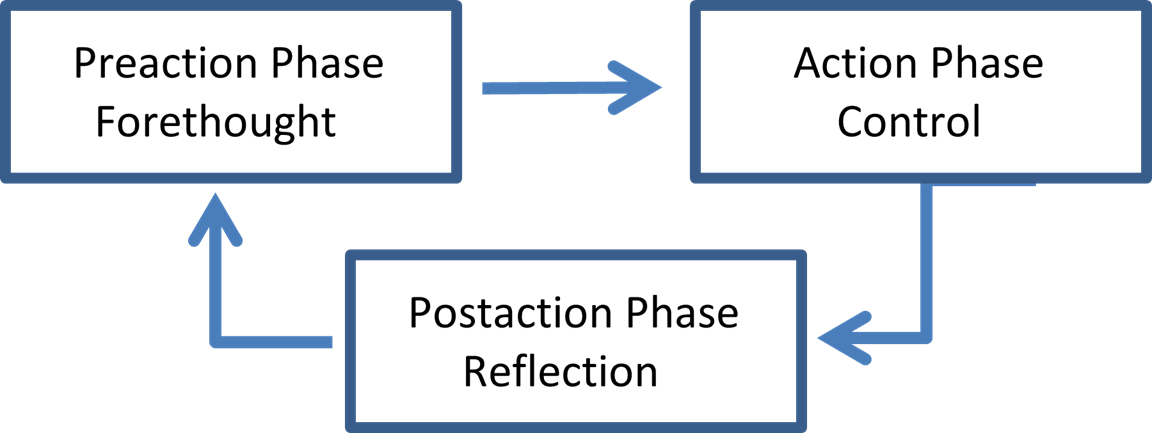Rubicon model (psychology) on:
[Wikipedia]
[Google]
[Amazon]
 In
In
 In
In psychological
Psychology is the scientific study of mind and behavior. Its subject matter includes the behavior of humans and nonhumans, both consciousness, conscious and Unconscious mind, unconscious phenomena, and mental processes such as thoughts, feel ...
theories of motivation
Motivation is an mental state, internal state that propels individuals to engage in goal-directed behavior. It is often understood as a force that explains why people or animals initiate, continue, or terminate a certain behavior at a particul ...
, the Rubicon model, more completely the Rubicon model of action phases, makes a distinction between motivational and volitional processes. The Rubicon model "defines clear boundaries between motivational and action phases." The first boundary "separates the motivational process of the predecisional phase from the volitional processes of postdecisional phase." Another boundary is that between initiation and conclusion of an action. A self-regulatory feedback model incorporating these interfaces was proposed later by others, as illustrated in the figure.
The name "Rubicon model" derives from the tale of Caesar's crossing the Rubicon River, a point of no return, thereby revealing his intentions. According to the Rubicon model, every action includes such a point of no return at which the individual moves from goal setting to goal striving.
:"Once subjects move from planning and goal-setting to the implementation of plans, they cross a metaphorical Rubicon. That is, their goals are typically protected and fostered by self-regulatory activity rather than reconsidered or changed, often even when challenged."
::— Lyn Corno, ''The best laid plans'', p. 15 (quoted by Rauber)
The Rubicon model addresses four questions, as identified by Achtziger and Gollwitzer:
#How do people select their goals?
#How do they plan the execution of their goals?
#How do they enact their plans?
#How do they evaluate their efforts to accomplish a specific goal?
The study of these issues is undertaken by both the fields of cognitive neuroscience
Cognitive neuroscience is the scientific field that is concerned with the study of the Biology, biological processes and aspects that underlie cognition, with a specific focus on the neural connections in the brain which are involved in mental ...
and social psychology
Social psychology is the methodical study of how thoughts, feelings, and behaviors are influenced by the actual, imagined, or implied presence of others. Although studying many of the same substantive topics as its counterpart in the field ...
. A possible connection between these approaches is brain imaging work attempting to relate volition to neuroanatomy
Neuroanatomy is the study of the structure and organization of the nervous system. In contrast to animals with radial symmetry, whose nervous system consists of a distributed network of cells, animals with bilateral symmetry have segregated, defi ...
.
Background
Human action coordinates such aspects ofhuman behavior
Human behavior is the potential and expressed capacity (Energy (psychological), mentally, Physical activity, physically, and Social action, socially) of human individuals or groups to respond to internal and external Stimulation, stimuli throu ...
as perception, thought, emotion, and skills to classify goals as attainable or unattainable and then to engage or disengage in trying to attain these goals. According to Heckhausen & Heckhausen, "Research based on the Rubicon model of action phases has provided a wealth of empirical evidence
Empirical evidence is evidence obtained through sense experience or experimental procedure. It is of central importance to the sciences and plays a role in various other fields, like epistemology and law.
There is no general agreement on how the ...
for mental and behavioral resources being orchestrated in this manner." Engagement and disengagement with goals affects personal distress
In psychology, personal distress is an aversive, self-focused emotional reaction (e.g., anxiety, worry, discomfort) to the apprehension or comprehension of another's emotional state or condition. This negative affective state often occurs as a res ...
over the unachievable. "By having new goals available, and reengaging in those new goals, a person can reduce distress....while continuing to derive a sense of purpose in life by finding other pursuits of value."
See also
*Cognitive psychology
Cognitive psychology is the scientific study of human mental processes such as attention, language use, memory, perception, problem solving, creativity, and reasoning.
Cognitive psychology originated in the 1960s in a break from behaviorism, whi ...
*Executive functions
In cognitive science and neuropsychology, executive functions (collectively referred to as executive function and cognitive control) are a set of cognitive processes that support goal-directed behavior, by regulating thoughts and actions thro ...
*Delayed gratification
Delayed gratification, or deferred gratification, is the ability to resist the temptation of an immediate reward in favor of a more valuable and long-lasting reward later. It involves forgoing a smaller, immediate pleasure to achieve a larger o ...
*Motivation
Motivation is an mental state, internal state that propels individuals to engage in goal-directed behavior. It is often understood as a force that explains why people or animals initiate, continue, or terminate a certain behavior at a particul ...
*Self-control
Self-control is an aspect of inhibitory control, one of the core executive functions. Executive functions are cognitive processes that are necessary for regulating one's behavior in order to achieve specific goals.
Defined more independen ...
*Self-efficacy
In psychology, self-efficacy is an individual's belief in their capacity to act in the ways necessary to reach specific goals. The concept was originally proposed by the psychologist Albert Bandura in 1977.
Self-efficacy affects every area of hum ...
*Self-regulated learning
Self-regulated learning (SRL) is one of the domains of self-regulation, and is aligned most closely with educational aims. Broadly speaking, it refers to learning that is guided by '' metacognition'' (thinking about one's thinking), ''strategic ac ...
*Self-regulation theory
Self-regulation theory (SRT) is a system of conscious, personal management that involves the process of guiding one's own thoughts, behaviors and feelings to reach goals. Self-regulation consists of several stages. In the stages individuals must f ...
References
Autonomy Decision theory Free will Motivation Planning {{psychology-stub